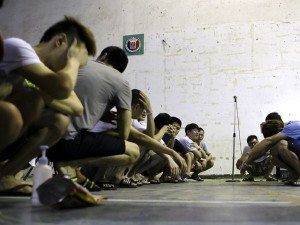
Some of 357 Taiwanese and Chinese nationals wait to be processed in a gymnasium at the Philippine National Police’ Camp Vicente Lim in Laguna province south of Manila, Philippines after being rounded up in a police operation Thursday Aug. 23, 2012. The Taiwanese and mainland Chinese were rounded up allegedly for their involvement in cybercrime in the country. AP/Bullit Marquez
MANILA, Philippines—The Bureau of Immigration on Friday deported 27 Chinese nationals supposedly involved in what authorities described as the single biggest operation in the history of cybercrime.
The Chinese suspects were among the more than 300 foreigners—mostly Taiwanese and already sent back to their country—arrested last month for involvement in cyberfraud, according to BI Commissioner Ricardo David Jr.
David disclosed that the aliens left the Ninoy Aquino International Airport on a Philippine Airlines flight Friday afternoon. Prior their deportation, the Chinese nationals were detained at Camp Vicente Lim in Calamba, Laguna.
The aliens were expelled pursuant to a summary deportation order issued on September 7 by the BI board of commissioners, which found them to be “undocumented, overstaying and undesirable aliens” and “serious threats to the general welfare and public policy.”
“They were also placed in our blacklist, thus they are banned from reentering the Philippines,” added the BI chief.
Friday’s deportees were among the 87 Chinese nationals and 291 Taiwanese arrested on August 23 in a joint anti-cybercrime operations by the police, immigration and naval intelligence in Metro Manila and Rizal province, said Ma. Antonette Mangrobang, BI acting intelligence chief.
Mangrobang said the alleged financiers of the syndicate, identified as Chinese Maria Luisa Tan and Taiwanese Jonson Tan Co, were already charged with violation of Republic Act No. 8484 or the Access Devices Regulation Act.
Investigation showed that the syndicate used the Internet to call and blackmail their victims in Taiwan and China by falsely informing them that their personal bank accounts were under investigation for money laundering and terrorist links.
The victims would then be asked to deposit their money in a bank account provided by the group.